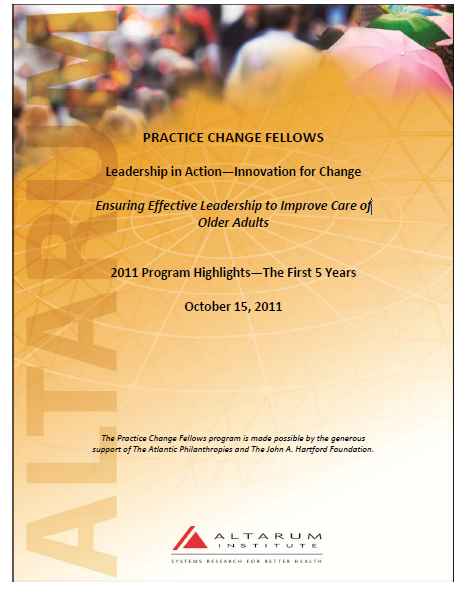 We’ve all seen the data. The number of older adults is on the rise. They bear a disproportionate burden of our dysfunctional health care system, both in terms of poor quality and higher spending. And while there are serious pockets of innovation addressing care of older adults, all too often leaders in health care settings lack the skills to implement and spread these important advances. In response to this national gap in leadership, The Atlantic Philanthropies—in partnership with the John A. Hartford Foundation—funded the Practice Change Fellows Program.
We’ve all seen the data. The number of older adults is on the rise. They bear a disproportionate burden of our dysfunctional health care system, both in terms of poor quality and higher spending. And while there are serious pockets of innovation addressing care of older adults, all too often leaders in health care settings lack the skills to implement and spread these important advances. In response to this national gap in leadership, The Atlantic Philanthropies—in partnership with the John A. Hartford Foundation—funded the Practice Change Fellows Program.
Five years and 38 fellows later, the Altarum Institute released a report that highlights the Practice Change Fellows Program’s successful efforts to develop change leaders who spread innovations that improve the health of older adults. The impacts are nothing short of astounding. The two-year Fellows program was the brainchild of Eric Coleman, MD, MPH, University of Colorado, and Nancy Whitelaw, PhD, from the National Council on Aging. The program aims to expand the number of health care leaders from medicine, nursing, and social work who can effectively promote high-quality care for older adults to a wide range of health and health care organizations. Fellows learned key skills to support spreading innovations, such as how to make the business case to the “C-suite” (CEO, CFO, etc…), and were mentored by leading experts in the field of aging.
The Practice Change Fellows report gives example after example of successful innovation and diffusion, including cutting edge approaches for dementia care, patient-centered health homes, care transitions, rural congestive heart failure management, delirium, and more.
They say that imitation is the sincerest form of flattery. We were honored that CMS used the Practice Change Fellows Program as a model for the Innovation Center’s Innovation Advisors Program, launched in late 2011. For those looking to develop and spread innovation by investing in leadership, we encourage you to read this report.
